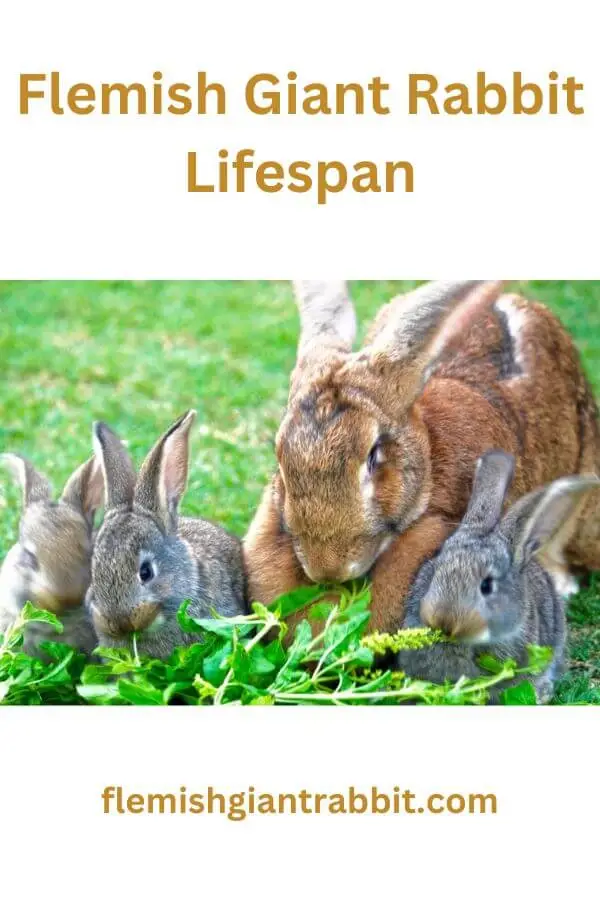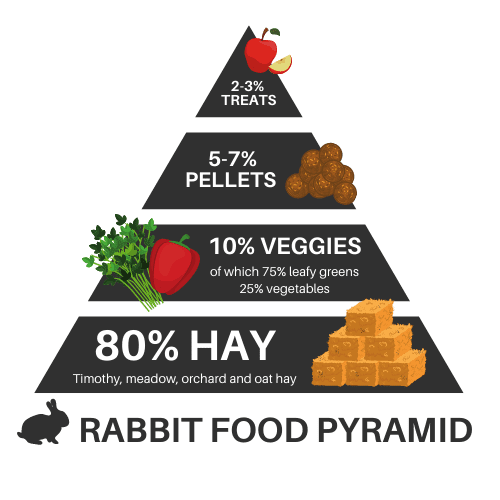
“Hello, Doc! I want to add a Flemish rabbit to my pet list, but I’m curious about how long it can live with me. What can you say about the Flemish Giant’s lifespan?”
That was a call I received from Mrs. Evelyn last week. Mrs. Evelyn is a passionate rabbit lover that can spend her last penny on rabbits.
I had a clarity session with her via the call. I explained to her the average lifespan of the Flemish giant rabbit, the factors influencing their lifespan, and how to make them live longer.
I know you also want to know about flemish giant rabbits’ lifespan and that’s why I am especially writing this article to clear your curiosity.
In this article, I will be talking about the average lifespan of Flemish Giant Rabbit Breeds, the causes of their untimely death, and the best care you should give them.
What’s the Average Lifespan of a Flemish Giant Rabbit?
The Flemish Giant Rabbit is one of the healthy rabbit breeds.
They are very strong rabbits but their lifespan depends on how you care for them and the diet and protection you give to them.
A typical Flemish rabbit could live 8 to 10 years. That simply means the lifespan of Flemish giant rabbits is eight (8) to ten (10) years.
However, that doesn’t mean yours may live up to that.
How Can I Ensure that My Flemish Giant Rabbit lives a long life?
Flemish Giant Rabbits make a great part of your families. You must look after them and try your best to help them live better and long-lasting lives. They deserve it!
As an experienced Veterinary Doctor in the clinic, I found out that Flemish Giant Rabbits as well as other rabbits tend to live longer if these 4 things are put in order.
Here are the 4 things you must do to help your Flemish giant live a longer life
Proper Nutrition
If I could ask you “What keeps you alive till now?” your honest response will be “because I eat daily”. Food plays a vital role in our lives just like the rabbits’ lives.
They need good feed to sustain themselves and cope with day-to-day activities. Your Flemish giant rabbit will look ill and stressed if poorly fed.
- Prepare their feed with the required feed ration to make it nutritional
- Clean their feeding materials and disinfect them against infection
The best feed you can give to your Flemish giant rabbits is Timothy Hay. However, Alfalfa Hay and pellets are good compliments.

In a nutshell, to extend the lifespan of your Flemish giant rabbit, proper nutrition is required.
Regular Exercise
Obesity, otherwise called Overweight can lead to the sudden death of your flemish giant rabbits. What can stop the Flemish giant from being overweight? It’s regular exercise.
Flemish Giant Rabbits as well as other rabbit breeds need regular exercise to keep themselves in good shape.
To make sure your Flemish Giants live long, keep them energetic and stress-free with a series of exercise activities.
However, Only well-structured and wide housing cages or hutches can allow the rabbits to hop around and roam about very well.
Regular Checkups with a Veterinary
Flemish giant rabbit breeds are very healthy rabbits, they react to any slight health issue. Create a time to check on your Flemish Giants and report any strange behavior to your Veterinary Doctor.
Take your Flemish giant to the clinic if
- Their poop changes:- A healthy flemish giant rabbit poops are always like small rounded balls of the same shape and color. Any slight change in this needs medical attention
- The Flemish giant rabbit isolates itself:- Isolation is a sign of illness in a Flemish giant rabbit. Healthy rabbits love hopping and roaming about.
- Drooling occurs. The Flemish giant rabbit’s chin is always dry. Any unnecessary wetting of the chin shows the rabbit is ill
- The Flemish giant rabbit’s ear becomes too hot or cold.
- Discharging nose
- Breathing through mouth
- A change in urination
- Abnormal scratching of the Ear.
In a nutshell, Take your Flemish giant rabbit to a Veterinary Doctor if you notice any unusual changes.
This practice proves to extend the Flemish giant rabbit lifespan as well as other rabbit breeds.
Safe-Living Environment
Nothing can secure your flemish giant rabbits’ life than to put them in a safe environment.
A safe environment for your Flemish giant rabbit must be free from any external attacks or threats. Theft, disease outbreaks, and dogs are external attacks that can short-live your bunnies.
How Do I Know the Age of my Flemish Giant Rabbit?
Knowing your Flemish giant rabbit age can help you to determine the kind of food and medication it deserves.
Unfortunately, there’s no perfect way to determine the exact age of your Flemish giant rabbit.
However, there are some observations you can use to determine the estimated age of your bunny.
1-2 weeks old
If you notice your baby Flemish Giants’ eyes are closed, that means they are still 1 or 2 weeks old.
A baby Flemish Giant won’t open its eyes or eyes till the 10th or 1st day after birth. During this first week they were born, they had no fur on their skin.
2-3 weeks old
After the 10th day after birth, the baby Flemish giant opens its eyes and has little but soft delicate fur on its skin.
Bunnies of this age still need tender care from you to survive.
1 month old
Bunnies of this age have enough strength to hop around the cage. with their fully grown furs, they can adapt to harsh environments.
6-12 months old
This is the adolescent stage for rabbits.
Flemish Giant Rabbits of this age range gain weight each day until they reach 18 months old when they become fully matured
Mature Rabbits
Flemish Giant Rabbits reach the maturity stage after 18 months. At this stage, you might notice that your Flemish giant rabbits are not as energetic as before.
They will continue like this till their lifespans expire.
To know if your Flemish giant rabbit is mature, Observe the following parts of the animal.
- Teeth: Their teeth become yellowish and often suffer from tooth decay.
- Nails: Their nails become hardy and scaly when growing up
- Energy levels: you will notice they don’t hop around or do exercise as before. This is a sign of maturity of your Flemish giant rabbit.
- Muscle: they become weaker as they grow old and lose strength.
Mature Flemish giant rabbits tend to suffer from more health issues than young bunnies.
Frequently Asked Questions Related To Flemish Giant Rabbit Life Span
At What Age is a Flemish Giant Fully Grown?
A Flemish Giant Rabbit becomes fully grown when it reaches 18 months i.e 1.5 years of age. This is the period they eat large amounts of food.
How Big is a 6-month Old Flemish Giant?
A 6 month old Flemish Giant Rabbit has an average weight of 11 – 13 pounds. Its ear length is around 6 inches long.
Do FLEMISH GIANT Need a Cage?
Yes, A Flemish Giant Rabbit needs a cage. Because of its huge size, it needs an extra-large cage .
Small Cages can restrict your Flemish giant rabbits to move freely and exercise well. Therefore, you should construct a wide cage for them. The minimum cage size for a big Flemish giant rabbit is 3 ft by 4 ft.
Do Flemish Giant Rabbits Grow Fast?
Flemish Giant Rabbits grow faster than some other breeds of rabbits. Flemish giant rabbits reach their maturity stage when they are 18 months old.
What’s the Heaviest Flemish Giant?
The world’s heaviest Flemish giant rabbit is Darius. Darius is a Guinness World Record holder. It holds the world’s heaviest Flemish Giant Rabbit since 2010
Darius weighs 22.2 kg (49 lb) and measures 4 ft 3 inches (1.3 m).
Conclusion:- Flemish Giant Rabbit Lifespan
The Flemish Giant Rabbit is a large and docile rabbit that can make a great addition to your pet list. Its average lifespan is around 10 years, but this can be influenced by various factors.
Domestic-bred Flemish Giant Rabbits may be exposed to unhygienic environments, food poisoning, dogs, and disease outbreaks.
Regular exercise helps to prevent obesity, and a well-structured and wide housing cage or hutch can allow the rabbit to roam around freely. Regular checkups with a veterinarian are important to detect and treat any health issues early.
Finally, a safe environment that is free from external attacks and threats will go a long way in ensuring your Flemish Giant Rabbit lives a long and healthy life.
By taking good care of your Flemish giant rabbit, you can enjoy the companionship and joy that it brings for many years.